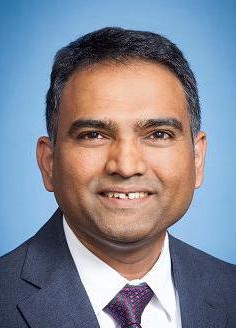
June 2024
Shanmuganathan Chandrakasan began his research during medical school in India, investigating an outbreak of sepsis in a neonatal ICU as part of a WHO-sponsored study. Dr. Chandrakasan conducted source tracing and microbiology work to identify the pathogen's origin and the exact strain causing the outbreak. He says, "That's where I was inspired during medical school. Even at a medical student level, research can make an impact on patient care. By identifying the outbreak and its source, we were able to stop the spread of neonatal sepsis in ICUs." One of the main reasons Dr. Chandrakasan moved to the U.S. was to pursue additional sub-specialization and bench research in immune dysregulation and BMT, aiming to find novel biomarkers to identify high-risk immune morbidity and develop better treatment strategies.
Dr. Chandrakasan currently leads the Immune Dysregulation and Immunohematology Program at Children's, where he studies patient-derived samples and murine models to identify early biomarkers of immune dysregulation and hyperinflammation. Based on these findings, he helps establish novel treatments for patients across all sub-specialties. His lab is involved in unraveling the immunological basis of several hematological disorders. One focus area for Dr. Chandrakasan and his team is to enhance our immunobiological understanding of immune cytopenia (immune thrombocytopenia, autoimmune hemolytic anemia, and Evans syndrome) and hemophagocytic lymphohistiocytosis (HLH). His lab has been instrumental in defining the broad adaptive and innate immune dysregulation and deficiency seen in patients with complex immune cytopenia and identifying therapeutic targets that improve not only immune cytopenia but overall immune health. His ongoing work is focused on defining immune endotypes of immune cytopenia to identify patients at risk of high immune morbidity and chronic/relapsing disease. Similar studies in HLH/hyperinflammation have identified early biomarkers of HLH, organ-specific hyperinflammation, and secondary immune deficiency in hyperinflammatory states.
Dr. Chandrakasan also leads the Immune Defect Transplant Program at Children's. Bone marrow transplant (BMT) is a definitive cure for many patients with life-threatening immune and blood disorders. However, it is offered to only a small subset of patients, partly due to the toxicities and mortality associated with transplants. The high-intensity chemotherapy/irradiation used in BMT conditioning contributes significantly to immediate and long-term morbidity and mortality, including infertility and second cancers. To address this, Dr. Chandrakasan's lab, in collaboration with the Cell and Gene Therapy program, has been working on non-genotoxic conditioning methods that enable transplants without chemotherapy or radiation. They have developed antibody-immune conjugates that specifically bind to hematopoietic stem cells and clear them without the need for high-dose chemotherapy or irradiation. Dr. Chandrakasan has demonstrated in various mouse models, both for transplant and gene therapy, that he can minimize or avoid the need for chemotherapy in these settings.
Through his research and clinical expertise, one of Dr. Chandrakasan's long-term goals is to develop a "Center of Excellence" focused on the early identification of high-risk immune dysregulation patients across all sub-specialties using novel biomarkers. This center will facilitate individualized pathway-directed therapy and ultimately lead to potentially curative, non-genotoxic transplants for patients with immune dysregulation disorders.

